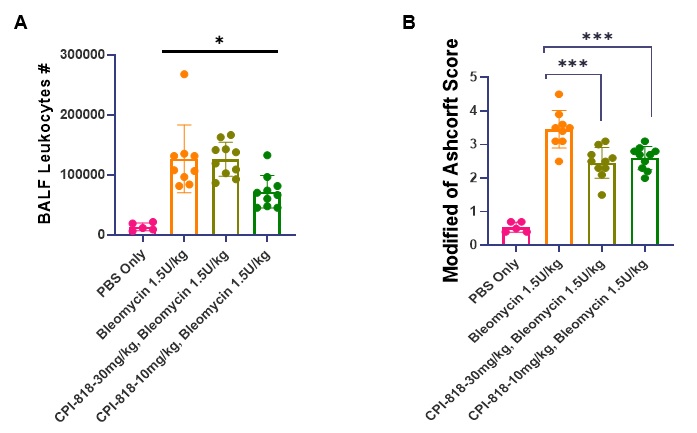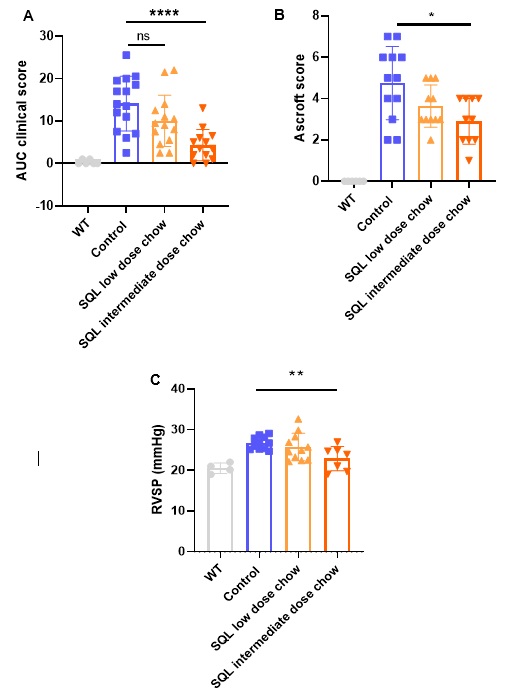Session Information
Date: Sunday, November 17, 2024
Title: Systemic Sclerosis & Related Disorders – Basic Science Poster I
Session Type: Poster Session B
Session Time: 10:30AM-12:30PM
Background/Purpose: T cells abnormal activation plays a pivotal role in the early inflammatory stages of systemic sclerosis (SSc). Compelling evidence supports that SSc has a predominant Th2 and Th17 polarization. Interleukin-2-inducible T cell kinase (ITK) is a tyrosine kinase that promotes T cell activation, differentiation, and receptor signaling, Studies in knockout or gene-altered mice indicated that inactivation or deletion of ITK reduces not only Th2 pathways but also Th17 pathways, with minimal inhibition of Th1 cells. Soquelitinib (SQL), is a highly selective, covalent, inhibitor of ITK. In vitro studies demonstrated that SQL suppresses Th2 and Th17 cytokine production preferentially and it also inhibits in vivo growth of several murine tumors through increased tumor infiltration of normal CD8+ cells. Given the immune pathogenesis of SSc with predominant Th2 and Th17 polarization, we aimed at investigating the efficacy of SQL in two mouse models of lung fibrosis, and related pulmonary hypertension (PH), mimicking lung involvement in SSc.
Methods: SQL has been evaluated in the bleomycin-induced lung fibrosis mouse model and in the Fra-2 mouse model characterized by interstitial lung disease (ILD) and pulmonary vascular remodeling leading to PH. Two doses of the drug were investigated.
Results: In the bleomycin-induced lung fibrosis model, SQL significantly reduced the leukocytic infiltrate in the bronchoalveolar lavage fluid (p=0.013) (Figure 1A) and reduced the Ashcroft score (Figure 1B), which is indicative of structural lung damage, compared to vehicle treated mice (p< 0.001). In this model, SQL reduced the expression of the major transcription factor controlling Th2 cytokine expression, GATA-3 (p=0.034), and the mRNA associated with fibrosis, MMP2 (p=0.022).
In the Fra-2 model, mice treated with SQL showed better clinical outcomes (clinical score of disease manifestations) compared to untreated Fra-2 mice (p< 0.0001) (Figure 2A). SQL alleviated lung fibrosis; it significantly reduced the fibrosis histological score as assessed by the Ashcroft score (p< 0.05) (Figure 2B). Although there were no significant differences in lung density when assessed by chest micro-CT imaging. Cardiovascular investigations revealed a significantly reduced right ventricular systolic pressure (23.9 mmHg vs. 26.7 mmHg, p=0.004) in SQL-treated Fra-2 mice compared to untreated Fra-2 mice (Figure 2C). Investigating myocardial thickness did not reveal significant differences between SQL-treated mice and control ones. Finally, SQL reduced Th2-dependent GATA3 and Th17-dependent RORγt expression in lesional lungs of bleomycin and Fra-2 mice. A dose effect was observed in the various experiments.
Conclusion: Our findings suggest that ITK inhibition with SQL, by decreasing Th2 and Th17 activation, provides therapeutic benefits in 2 complementary models of SSc lung damage. Given the importance of T cell activation in the early stages of the disease, there is a strong rationale for the potential benefit of T cell-targeting therapy in SSc. SQL represents a promising new approach for treating lung involvement in SSc, warranting clinical trials.
To cite this abstract in AMA style:
Boleto G, Cauvet A, Rose J, Hsu L, Miller R, Allanore Y. Inhibition of Interleukin-2-Inducible T Cell Kinase with Soquelitinib Demonstrates Efficacy in Preventing Lung Damage in Murine Models of Systemic Sclerosis [abstract]. Arthritis Rheumatol. 2024; 76 (suppl 9). https://acrabstracts.org/abstract/inhibition-of-interleukin-2-inducible-t-cell-kinase-with-soquelitinib-demonstrates-efficacy-in-preventing-lung-damage-in-murine-models-of-systemic-sclerosis/. Accessed .« Back to ACR Convergence 2024
ACR Meeting Abstracts - https://acrabstracts.org/abstract/inhibition-of-interleukin-2-inducible-t-cell-kinase-with-soquelitinib-demonstrates-efficacy-in-preventing-lung-damage-in-murine-models-of-systemic-sclerosis/


